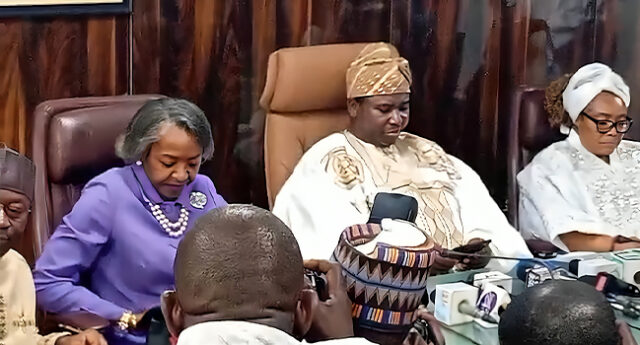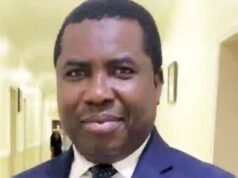By editor
The newly appointed Chairman of the Independent National Electoral Commission (INEC), Prof. Joash Ojo Amupitan, has been urged to consolidate on the gains and reforms achieved under the immediate past Chairman of the commission, Prof. Mahmood Yakubu.
Members of key Civil Society Organisations (CSOs) in the country made the call on Wednesday in Abuja at a colloquium organised by the Centre for Transparency Advocacy (CTA) to celebrate achievements and reforms INEC recorded under Yakubu.
According to them, sustaining the integrity of Nigeria’s electoral process requires the collective commitment of political parties, the judiciary, security agencies, and citizens, especially as the nation moves towards the 2027 general elections.
The colloquium, themed “Strengthening Nigeria’s Democracy: Reflections on a Decade of INEC Leadership,” brought together political leaders, academics, and civil society actors.
They were unanimous is positing that consolidating on the institutional and technological foundations laid under Yakubu’s leadership is key to building a more credible, transparent, and resilient electoral system in Nigeria.
The Deputy National Chairman of the inter party advisory council (IPAC), Hon. Dipo Olayoku, noted that the conduct of elections in Nigeria is one of the most complex national responsibilities, as the problem goes beyond the electoral body itself.
He said conducting elections in Nigeria is no easy task, especially that many Nigerians still believe that once they take part in an election, they must win.
“We all remember the ‘do-or-die’ politics of 2007. That mindset remains one of the biggest challenges facing our democracy,” Olayoku said.
He commended Prof. Yakubu for introducing technology-driven reforms that have improved transparency and credibility in Nigeria’s electoral system.
He said, “Through the use of technology, Professor Yakubu made our elections more credible and acceptable. His innovations have brought a new level of transparency to Nigeria’s electoral process.”
He also lamented that the absence of accountability for electoral offences continues to undermine progress, saying when wrongdoing goes unpunished, even reform-minded leaders can only do so much.
The Executive Director of the Centre for Transparency Advocacy (CTA), Ms Faith Nwadishi, said the colloquium was organised not only to celebrate Yakubu’s achievements but to reflect on lessons learned and chart a way forward.
She said that INEC recorded significant gains through innovations such as the deployment of the Bimodal Voter Accreditation System (BVAS), electronic result transmission, improved logistics, and stronger stakeholder engagement.
“INEC institutionalised continuous voter registration, expanded stakeholder consultations, and strengthened its internal systems. Importantly, Prof. Yakubu opened INEC’s doors wider to civil society, media, and other groups, and prioritised transparency in election management.
“He was also gender-sensitive, creating the first crèche at the INEC headquarters to support nursing mothers at work,” Nwadishi said.
She also expressed concern over persistent challenges, including insecurity, vote-buying, voter intimidation, and apathy, which continue to threaten the credibility of elections.
Also, the Executive Director of the Pioneering Advocacy and Advancement Centre in Nigeria (PAACA), Chief Ezenwa Nwagwu, said Yakubu’s tenure marked a period of remarkable innovation.
He said that the digitisation of electoral processes, particularly the electronic transmission of results via the INEC Result Viewing Portal (IReV), as a transformative step that promoted greater transparency.
He said, “Though it was not perfect, it was a step in the right direction. The INEC candidate nomination portal was another innovation that helped end the culture of politicians disturbing or attempting to influence INEC officials.
“It brought sanity and contributed significantly to the advancement of our electoral process. Continuous voter registration was also a major reform that must be sustained.”
Presenting the keynote Prof. Emmanuel Aiyede, of the Political Institutions, Governance and Public Policy at the University of Ibadan, said that technology alone cannot guarantee credible elections. He argued that the future of Nigeria’s democracy depends on institutional integrity and civic responsibility.
He said that democracy cannot rely solely on technology, as the future of Nigeria’s elections will depend on institutional cooperation and civic responsibility.
He described Yakubu’s decade-long leadership as a rehearsal for the future, urging the new INEC leadership to strengthen local elections, deepen voter participation, improve result management, and institutionalise post-election accountability.
“His leadership has shown that credible elections are not miracles of circumstance but outcomes of discipline in law, in process, and in principle. The Commission he leaves behind is not perfect, but it is purposeful; not without critics, but undeniably credible in its evolution,” Aiyede said.
Discover more from TheTimes Nigeria
Subscribe to get the latest posts sent to your email.








